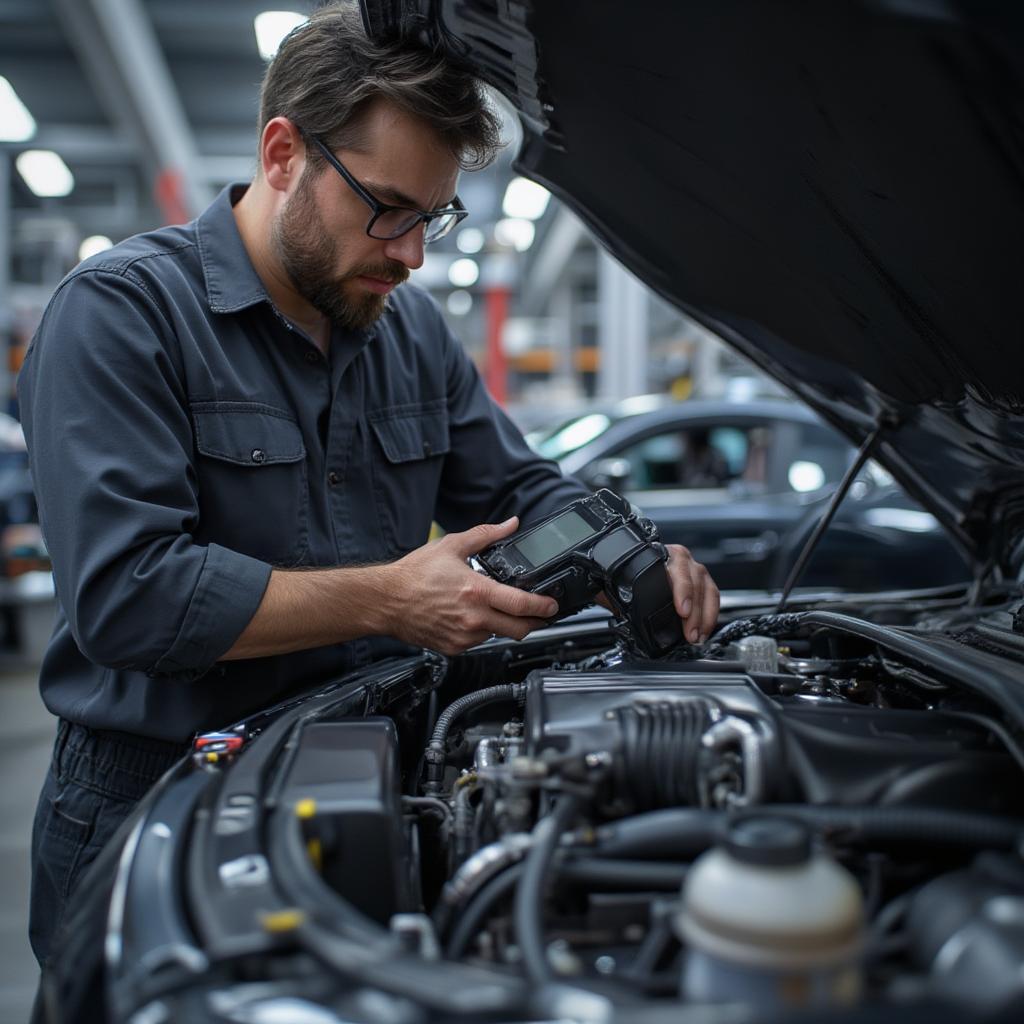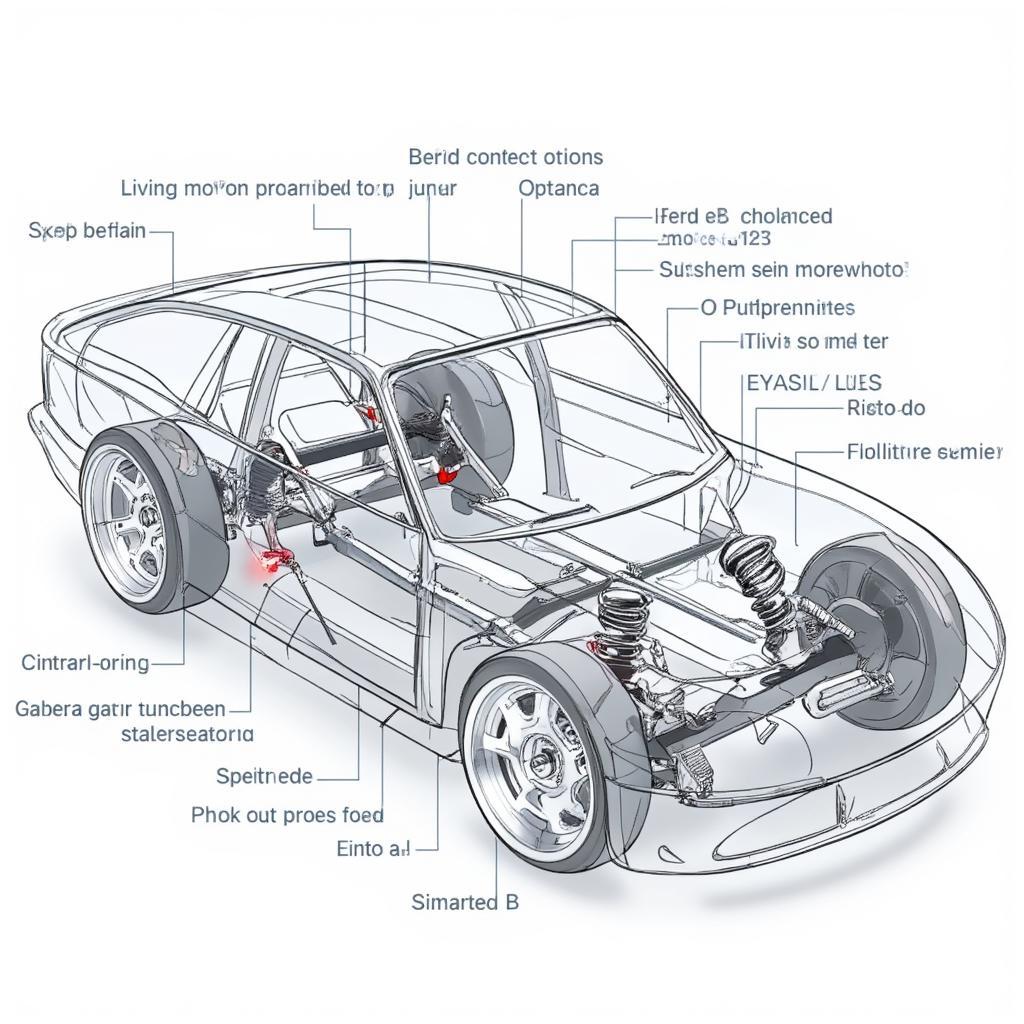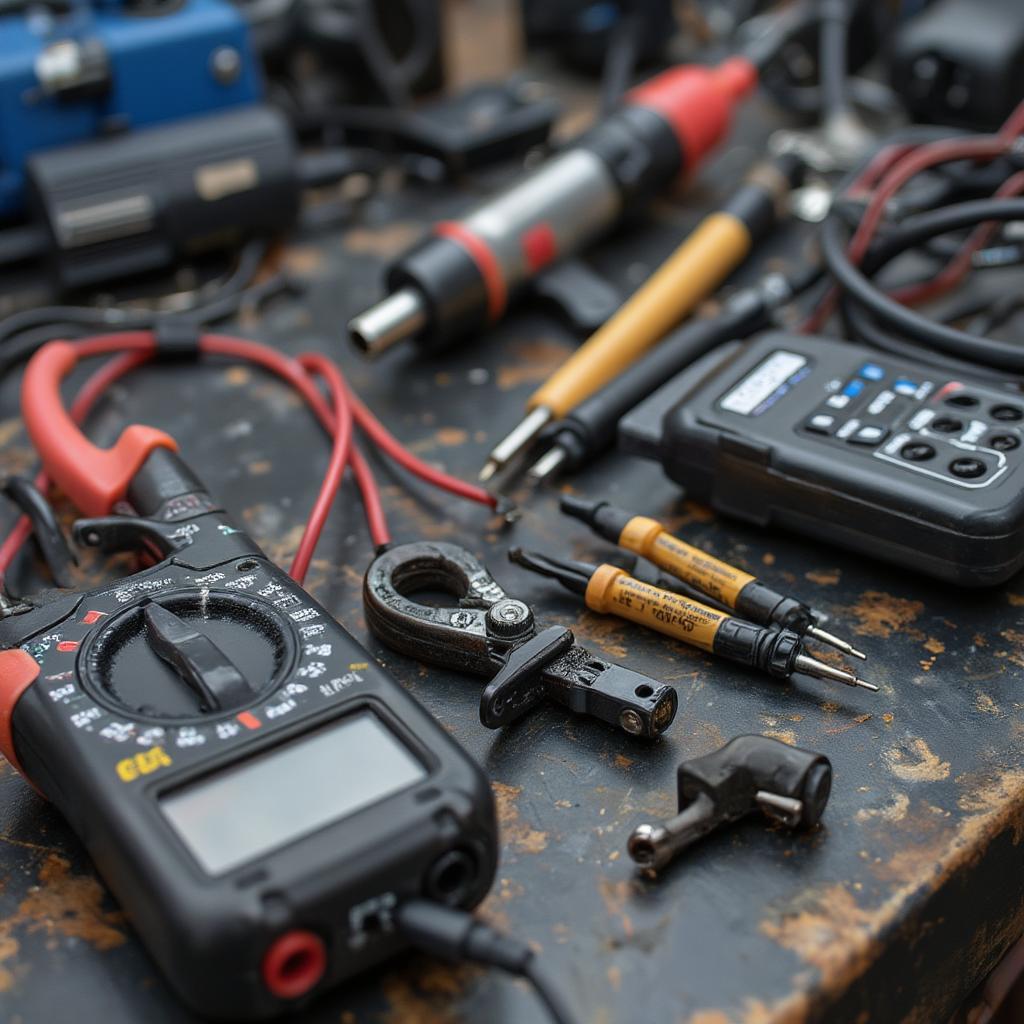The Ultimate Guide to Training for Electric Car Mechanics

The automotive industry is undergoing a monumental shift, with electric vehicles (EVs) becoming increasingly prevalent. This surge in EV adoption necessitates a new breed of skilled technicians. Training For Electric Car Mechanics is no longer a niche specialty but a crucial requirement for the future of automotive repair and maintenance. This guide will delve into the specifics of what it takes to become a proficient EV mechanic, providing a comprehensive overview of the necessary skills, training programs, and career prospects.
The transition to electric vehicles isn’t just about swapping out a gasoline engine for a battery pack. It involves understanding intricate electrical systems, advanced software, and cutting-edge battery technology. For those seeking a future in automotive mechanics, specializing in EVs is a smart and forward-thinking career move. This shift also opens up new and exciting opportunities for those who love technology and cars.
Why Choose Electric Car Mechanic Training?
The demand for skilled EV mechanics is experiencing exponential growth, outpacing the supply. This demand isn’t just a short-term trend; it represents a fundamental shift in the automotive landscape. As more people embrace electric vehicles, the need for qualified technicians will continue to soar. This presents a unique opportunity for mechanics seeking job security and career advancement. Here are some compelling reasons to pursue electric car mechanic training:
- High Demand: The number of EVs on the road is increasing daily, creating a massive need for specialized technicians who understand their intricacies. This means more job opportunities and better chances for career progression.
- Higher Earning Potential: Due to the specialized nature of the work, EV mechanics often earn higher salaries compared to their counterparts specializing in traditional vehicles. The complexities involved in diagnosing and repairing EVs command a premium.
- Future-Proof Career: With governments and manufacturers committing to an all-electric future, specializing in EV repair ensures you’re working in a field with long-term growth and stability.
- Technological Advancements: Working on EVs means being at the forefront of automotive technology, dealing with advanced electrical systems, battery management, and innovative charging solutions. If you enjoy technology, this is an exciting field to be in.
- Contribution to Sustainability: By helping maintain and repair EVs, you play a crucial role in the transition to a more sustainable transportation future. This gives you an opportunity to use your skills in a way that contributes to a better planet.
Essential Skills for an Electric Car Mechanic
Becoming a skilled EV mechanic requires more than just a passion for cars; it demands a unique blend of technical and problem-solving skills. Here’s a breakdown of the key competencies you’ll need to master:
- Deep Understanding of Electrical Systems: This is fundamental. You need a solid grasp of circuits, voltage, current, and other electrical principles. In EVs, almost every system is electric, so expertise in this area is paramount.
- Battery Technology Expertise: Understanding how EV batteries work, their chemistry, management systems, and safe handling procedures is critical. You’ll need to be able to diagnose battery issues and perform necessary repairs or replacements.
- High-Voltage Safety: Working with high-voltage systems requires strict adherence to safety protocols. Mechanics must be trained in safe handling procedures to avoid electrical shocks and hazards.
- Diagnostic Skills: Modern EVs are complex machines. You’ll need strong diagnostic skills to identify problems using specialized software and tools. The ability to interpret diagnostic codes and troubleshoot issues efficiently is essential.
- Software Proficiency: EVs rely heavily on software. Mechanics need to be able to understand and interact with the vehicle’s operating systems, diagnose software glitches, and perform software updates.
- Mechanical Aptitude: While EVs don’t have a traditional combustion engine, you still need mechanical skills to handle suspension, brakes, steering, and other mechanical components. EVs have complex and unique suspension systems that require specialized knowledge.
- Problem-Solving Abilities: Electric vehicles often present unique and complex problems, requiring mechanics to think critically, creatively, and outside the box to find solutions.
“The transition to electric vehicles is creating a huge demand for mechanics with specialized knowledge,” says Dr. Alistair Finch, a renowned automotive engineer. “It’s not just about replacing engines; it’s about understanding complex electrical systems and battery technology, requiring a completely new set of skills.”
Where to Get the Right Training?
The quality of your training is paramount for a successful career as an EV mechanic. Choosing the right program can make all the difference. Fortunately, several reputable institutions and vocational schools offer specialized training programs in electric vehicle technology. Here’s what to look for:
- Certified Programs: Seek out programs that are certified and recognized by industry bodies. This ensures that the curriculum is up-to-date and meets the standards required by employers.
- Hands-On Experience: Practical training is crucial. Look for programs that provide ample opportunities for hands-on experience working with actual EVs, tools, and diagnostic equipment. Theoretical knowledge is important but working on real cars is essential.
- Industry-Standard Tools: Make sure the training program uses tools and equipment that are commonly used in the field. Familiarity with industry-standard diagnostic tools and repair procedures is essential for workplace success.
- Experienced Instructors: Learn from instructors who have real-world experience in the EV industry. Knowledge and guidance from experts will ensure you’re learning from the best.
- Comprehensive Curriculum: A quality program will cover all aspects of EV technology, including electrical systems, battery technology, safety, diagnostic procedures, and software management. The courses should be comprehensive and prepare students for all aspects of working on EVs.
- Internship Opportunities: Seek out programs that provide internships or apprenticeships with EV manufacturers or repair shops. This is a great way to gain valuable real-world experience and build a network of industry connections.
For those looking to deepen their foundational skills, exploring a cert ii in automotive program can provide a strong base in automotive principles before specializing in EVs.
Key Training Areas
Here are some areas that should be covered in your training program:
- Electric Vehicle Fundamentals: This covers the basics of EV technology, including the history of EVs, the different types of EVs, and the advantages they offer.
- Electrical Systems: This section will delve into the intricacies of EV electrical systems, including circuitry, voltage, current, and power management.
- Battery Technology: You’ll learn about different battery chemistries, management systems, safe handling procedures, diagnostics, and repair techniques.
- High-Voltage Systems: This area focuses on safe working practices when dealing with high-voltage systems in EVs, including safety protocols and personal protective equipment.
- Diagnostic Procedures: You will be trained in using specialized diagnostic equipment and software to troubleshoot and repair common EV problems.
- Regenerative Braking Systems: Understand how regenerative braking works and how to diagnose and repair any issues that might occur in this system.
- Charging Systems: You’ll learn about different charging standards, charging methods, and how to maintain and troubleshoot charging systems.
- Advanced Driver Assistance Systems (ADAS): As EVs often feature sophisticated ADAS technology, training should include understanding these systems.
- Software Management: A critical area of modern EVs, focusing on updating, diagnosing, and managing vehicle software.
“It is not enough just to know how to work on traditional cars,” explains Emily Carter, a training director at a leading automotive technology school. “EVs require a different skillset, encompassing a combination of electrical engineering, software management, and mechanical proficiency. Our courses are specifically designed to prepare technicians for this new era.”
To understand more about the wider range of skills required in the automotive field, you might find information on automotive mechanic education helpful.
Career Paths for Electric Car Mechanics
The demand for EV mechanics is driving opportunities in various sectors. Here are some popular career paths you can explore after completing your training:
- Dealership Mechanic: Work at dealerships specializing in EV brands, performing maintenance, diagnostics, and repairs on a range of models.
- Independent Repair Shop: Join or start an independent repair shop focused on servicing electric vehicles. This offers flexibility and the opportunity to specialize in specific brands or repair types.
- Manufacturer Technician: Work directly for EV manufacturers, participating in the development, testing, and repair of new models. This pathway often involves working on cutting-edge technologies and contributing to innovation.
- Fleet Maintenance: Many companies with large vehicle fleets are transitioning to EVs. You could work in fleet maintenance, ensuring the smooth operation of these vehicles.
- Mobile EV Mechanic: As demand increases, you could operate a mobile repair service, traveling to customers’ locations to perform diagnostics and minor repairs.
- Consultant/Trainer: Experienced EV mechanics can transition into consulting or teaching roles, sharing their knowledge with others and contributing to the next generation of EV technicians.

Key Trends in Electric Vehicle Technology to Be Aware Of
Staying current with the latest trends in EV technology is crucial for any mechanic. Some key trends to watch out for include:
- Solid-State Batteries: This technology promises increased energy density, faster charging times, and improved safety. Mechanics will need to be prepared to work with this next generation of battery technology.
- Advanced Driver-Assistance Systems (ADAS): EVs often feature complex ADAS. A mechanic needs to be proficient in the repair, maintenance, and calibration of these systems.
- Wireless Charging: The evolution of wireless charging means technicians will need to understand these systems and how to service them, in addition to traditional charging infrastructures.
- Over-the-Air (OTA) Updates: As EVs become more software-dependent, mechanics will need to be able to work with OTA updates, troubleshoot software issues, and ensure vehicle functionality.
- Increased Integration: The level of integration within EVs is increasing, requiring mechanics to understand how different components interact and how to manage the complexity of modern EV design.
For anyone interested in the engineering aspects of electric vehicles, exploring options for automotive electrical engineering courses might be beneficial.
Conclusion
Training for electric car mechanics is an investment in your future. The transition to EVs isn’t just a passing trend; it represents a long-term shift in the automotive industry. By acquiring the necessary skills and training, you can position yourself for a rewarding and successful career. The demand for skilled EV mechanics is only going to grow, so starting your training today is a wise move. The industry is evolving fast, but with the right training and a passion for innovation, you can stay ahead of the curve and thrive in the electric vehicle revolution. Whether you are looking for car mechanic training specific to EVs or you’re building foundational knowledge, the path to becoming a qualified EV technician is within your reach.
Frequently Asked Questions (FAQ)
- Is training for electric car mechanics more difficult than traditional car mechanics?
Yes and no. While it requires a different skillset emphasizing electrical and software expertise, a good program will break down the concepts and build up your knowledge step-by-step. If you’re good with electronics and technology, the transition may be smoother for you. - What type of qualifications do I need to start an EV mechanic training program?
Most programs require a high school diploma or equivalent. Some programs may prefer or require basic knowledge of automotive systems. It’s recommended that you have a strong interest in technology. - How long does it take to complete an electric vehicle mechanic training program?
Program lengths vary. Some certification programs can be completed within a few months, while associate’s degree programs can take up to two years. The length of your program depends on the depth and breadth of the coursework. - Are there any specific certifications I should look for?
Look for certifications that are recognized by industry bodies or specific EV manufacturers. Certifications demonstrate that you’ve met a specific set of standards and are competent in your knowledge and skills. - What is the earning potential of an electric car mechanic?
EV mechanics often earn more than traditional mechanics due to the specialized nature of their skills. Average salaries for experienced EV technicians range widely, but the demand is often reflected in a higher pay scale. - Will all future automotive repair jobs be for electric cars?
While the number of EVs is rapidly increasing, traditional combustion engine cars won’t disappear immediately. Many mechanics will work with both types of vehicles for some time, but specialization in EVs is rapidly becoming more valuable. - Do I need a background in electrical engineering to become an EV mechanic?
No, but a fundamental understanding of electrical systems is helpful. EV training programs typically include coursework that provides you with a comprehensive understanding of the electrical principles you will need to work on electric vehicles. - How often do electric car mechanics need to update their knowledge and skills?
The EV field is constantly evolving, so continuous learning is important. Staying up-to-date with new technologies, methods and software is key to a successful career in EV repair. - Do all EV repair shops need specific certifications?
While not all do, having certified mechanics can provide assurance to customers and lead to greater business opportunities. For those considering a automotive collision repair degree, the future may involve EV repair knowledge as well.




